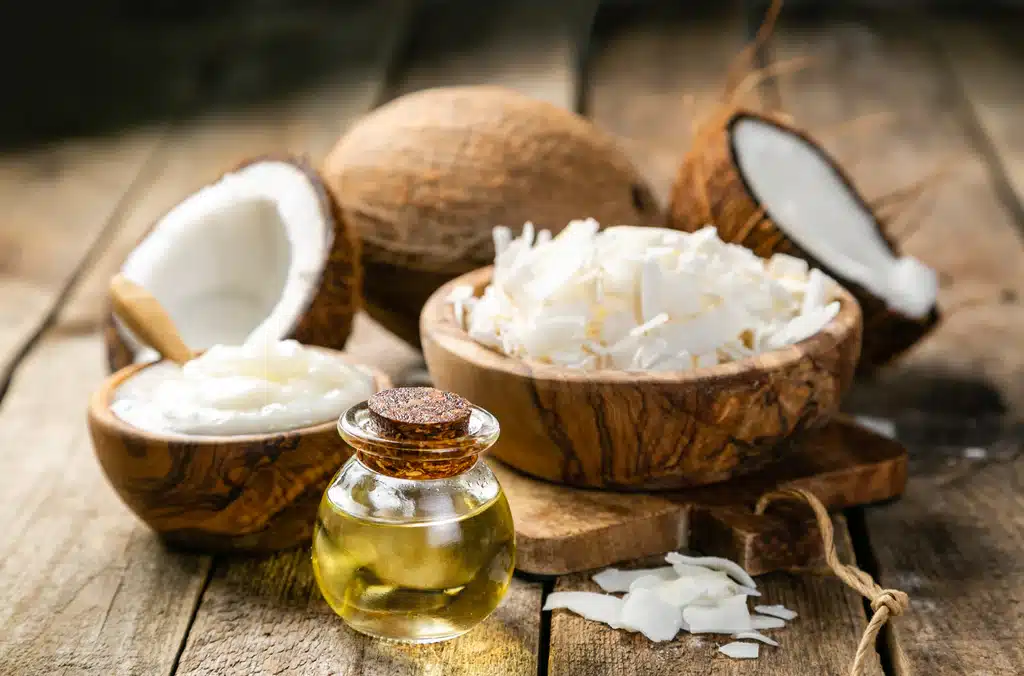Introduction
When To Take Mct Oil For Weight Loss: In the ever-evolving landscape of weight loss strategies, the incorporation of dietary supplements has become a prominent topic of discussion. One such supplement that has gained considerable attention in recent years is Medium-Chain Triglyceride (MCT) oil. MCT oil is derived from coconut oil or palm kernel oil and is praised for its potential benefits in aiding weight loss. However, one crucial aspect of harnessing its potential is the timing of consumption. Understanding when to take MCT oil for weight loss is a pivotal consideration for those seeking to optimize its effects.
MCT oil is unique in its composition of medium-chain fatty acids, primarily caprylic acid (C8) and capric acid (C10). These fats are metabolized differently in the body compared to long-chain fatty acids found in most dietary fats. When MCTs are ingested, they are rapidly absorbed and transported to the liver, where they are converted into ketones. Ketones serve as an efficient source of energy, promoting fat burning and appetite suppression.
Many individuals find that taking MCT oil in the morning, perhaps mixed into their morning coffee or smoothie, provides an energy boost to kickstart the day. This may help in reducing cravings and promoting a sense of fullness, which can lead to reduced calorie intake throughout the day. MCT oil can be consumed before exercise as it provides quick energy, enhances endurance, and may help in burning more fat during the workout. This timing can maximize its impact on fat loss when combined with regular physical activity.

Should I take MCT oil on an empty stomach?
The quick answer to this question depends on your body, but for most people, it’s a no. If you’ve been taking MCT for a while, you may find you’re okay to take it on an empty stomach, but if you’re new to MCT, you may want to take things slow because it can cause digestive discomfort.
Weight Management: MCTs have been studied for their potential to promote weight loss and fat burning. They can increase thermogenesis, leading to the burning of calories and fat for energy.
Energy Boost: MCTs are quickly converted into energy by the liver, making them a popular choice for individuals following ketogenic or low-carb diets.
Improved Cognitive Function: Some research suggests that MCT oil may enhance cognitive function, especially in individuals with cognitive disorders like Alzheimer’s disease.
Faster Absorption: Consuming MCT oil on an empty stomach allows for quicker absorption, potentially leading to faster energy and cognitive benefits.
Ketosis: If you’re on a ketogenic diet, taking MCT oil on an empty stomach may help induce ketosis more rapidly.
What time of day should you take MCT oil?
Mornings
There’s no bad time to take MCT oil. It’s always good to have some in the kitchen for sleepy mornings or days when an afternoon slump hits.
Quick Energy Boost: MCTs are rapidly metabolized by the liver and converted into energy. Consuming MCT oil in the morning can provide a quick energy boost to kickstart your day, making it an ideal choice for those who want to enhance their morning alertness.
Ketogenic Diet: If you’re following a ketogenic or low-carb diet, morning intake can help you enter a state of ketosis more rapidly, as your body may have depleted its glycogen stores overnight.
Appetite Suppression: MCT oil can help suppress appetite, which can be beneficial if you’re aiming to control your calorie intake and maintain a calorie deficit for weight management.
Enhanced Stamina: MCTs can provide an immediate source of energy, which can help you power through your workouts with increased stamina.
Fat Burning: Consuming MCTs before exercise may encourage your body to burn more fat for energy during physical activity, making it a potential aid for those looking to lose weight.
Does MCT oil reduce belly fat?
While the research has been mixed, there is solid evidence that MCTs can support weight loss when combined with a healthy diet and lifestyle. They seem to do so by increasing feelings of fullness, reducing the body’s fat storage, cutting the body’s calorie intake, and increasing energy expenditure during exercise.
Increased Thermogenesis: MCTs are known to increase thermogenesis, which is the process of heat production in the body. This can lead to an increase in calorie expenditure, potentially aiding in weight loss.
Appetite Control: MCTs may help regulate appetite by promoting feelings of fullness. This can lead to reduced calorie intake, making it easier to maintain a caloric deficit for weight loss.
Ketosis: MCTs are often used by individuals following ketogenic diets to help them enter and maintain a state of ketosis. Ketosis is a metabolic state where the body burns fat for energy, potentially leading to fat loss, including from the abdominal area.
While MCT oil does offer potential benefits for weight management, it’s essential to clarify that spot reduction, or the idea that you can target fat loss in a specific area, is not supported by scientific evidence. Fat loss tends to occur throughout the body in a more generalized manner when a caloric deficit is maintained.
However, when you lose weight through methods such as calorie reduction and increased physical activity, you are likely to experience a reduction in overall body fat, including the fat stored in the abdominal area. This means that while MCT oil may contribute to overall fat loss, it doesn’t have the ability to specifically target belly fat.
How much MCT oil should I take per day for weight loss?
There are certain dietary dosages of MCT that can help you shed excess fat. In one clinical study, for example, participants lost more body weight by consuming a dosage of 18-24 grams of MCT oil a day, in comparison to the same consumption of olive oil.
Individual Tolerance: People may have different tolerances to MCT oil. Some individuals may experience digestive discomfort, such as diarrhea or stomach cramps, when they consume large quantities. It’s crucial to start with a lower dose and gradually increase it to assess your tolerance.
Weight Loss Goals: Your weight loss goals and the pace at which you aim to achieve them can affect the dosage. If you’re looking for gradual, sustainable weight loss, your MCT oil intake may differ from someone aiming for rapid weight loss.
Dietary Plan: Your overall dietary plan and macronutrient intake play a role in determining your MCT oil needs. For example, individuals on a ketogenic diet may require more MCT oil to support ketosis.
Activity Level: Your level of physical activity can impact your daily MCT oil requirements. More active individuals may benefit from higher MCT oil intake for energy and exercise performance.
Medical Conditions: If you have underlying medical conditions, such as liver disease or digestive disorders, it’s crucial to consult a healthcare professional before adding MCT oil to your diet.
Does MCT oil burn body fat?
MCT might help the body burn fat for energy
One older study found that athletes who took 6 grams or about 1.5 teaspoons of MCTs with food before cycling used more fat instead of carbs for energy, compared to those taking LCTs.
Increased Thermogenesis: MCTs have been shown to increase thermogenesis, the process by which the body generates heat and burns calories. This means that the consumption of MCT oil can potentially increase calorie expenditure, contributing to weight loss.
Energy Source: When MCTs are metabolized in the liver, they are converted into ketones, which can serve as an alternative energy source. This may lead to increased fat burning, particularly in individuals following a ketogenic diet.
Appetite Regulation: MCT oil may help regulate appetite by promoting feelings of fullness. If it reduces calorie intake, this can contribute to weight loss and fat loss over time.
Reduction in Fat Storage: Some studies suggest that MCT oil may reduce fat storage by increasing fat oxidation, particularly in the liver. This can potentially lead to a decrease in body fat over time.
Exercise Performance: Consuming MCT oil before exercise can enhance exercise performance, which may lead to more calories burned during physical activity.
Can I drink MCT oil with water?
Because it’s totally flavorless, MCT oil works in plenty of different drinks—with or without caffeine. Try blending it in tea, bone broth or infused water for an extra dose of MCTs.
Palatability: MCT oil has an oily texture and a somewhat neutral, slightly nutty flavor. Mixing it with water can help mask the oily sensation and make it more palatable for consumption.
Hydration: Combining MCT oil with water ensures that you stay hydrated while reaping the benefits of MCTs. Proper hydration is essential for overall health and well-being.
Easy to Incorporate: Adding MCT oil to water is a simple and time-efficient way to include it in your daily routine. It can be consumed on its own or added to other beverages like tea or coffee.
Quick Absorption: MCTs are rapidly absorbed by the body. Mixing MCT oil with water can promote quicker absorption and utilization of the MCTs, potentially leading to faster energy benefits.
Customizable Dosage: Mixing MCT oil with water allows you to customize the dosage to your preferences and needs. You can start with a small amount and gradually increase it as your body adapts.
Is it OK to take MCT oil everyday?
It’s important to remember that MCT oil is high in saturated fat and should be used in moderation. If you use MCT oil daily, you may need to scale back the intake of other dietary fats. Talk with a healthcare provider about how to safely use MCT oil.
Steady Energy: MCTs are quickly metabolized and can provide a consistent source of energy throughout the day, making daily consumption appealing for those seeking improved energy levels.
Appetite Control: Daily MCT oil intake may help regulate appetite by promoting feelings of fullness. This can be beneficial for weight management and calorie control.
Weight Management: For individuals following diets like keto or low-carb, daily MCT oil consumption can aid in entering and maintaining a state of ketosis, potentially supporting weight loss.
Cognitive Benefits: Some people may experience enhanced cognitive function and mental clarity with daily MCT oil intake, making it suitable for tasks that require focus and concentration.
Does MCT oil burn fat while you sleep?
MCT helps to maintain these spikes and keep blood sugar levels controlled, which is beneficial when trying to wind down for the evening before going to sleep. In addition to this, MCTs have also been shown to possibly increase fat oxidation (fat burning) while we sleep.
Sustained Energy: Consuming MCT oil during the day can provide a sustained source of energy, helping you stay active and potentially supporting weight loss. While this may indirectly contribute to fat burning, its effects during sleep are primarily related to the energy it provides during waking hours.
Improved Sleep Quality: Some individuals report improved sleep quality and reduced nighttime waking after consuming MCT oil. This might be due to the balanced energy supply provided by MCTs, which can help stabilize blood sugar levels and reduce fluctuations that might otherwise disrupt sleep.
Fat Burning While Asleep: While it’s true that the body continues to burn calories and fat during sleep, the extent to which MCT oil directly influences this process during the night is not well-documented. Most fat burning occurs during periods of physical activity and in response to dietary choices made during the day.

Conclusion
In the quest for effective weight loss strategies, the timing of MCT oil consumption emerges as a critical factor in harnessing its potential benefits. As we have explored, MCT oil, derived from coconut or palm kernel oil, possesses unique properties that can aid in weight management. When consumed strategically, it can enhance energy expenditure, promote satiety, and facilitate fat burning. However, as with any dietary supplement, it is essential to exercise caution and consider individual needs and goals.
It’s essential to approach MCT oil as part of a holistic weight loss strategy. Its benefits are most pronounced when combined with a balanced diet and regular physical activity. Moreover, individual responses to MCT oil may vary, and some individuals may experience digestive discomfort when first introducing it into their diet. Starting with small doses and gradually increasing can mitigate such issues.
Commencing your day with MCT oil can kickstart your metabolism and provide sustained energy. Adding it to your morning coffee or smoothie may help curb hunger, setting a positive tone for mindful eating throughout the day. Prior to exercise, MCT oil can serve as a potent energy source, enhancing endurance and aiding fat utilization during workouts. This timing can potentially amplify the calorie-burning effects of your exercise routine. Incorporating MCT oil into your fasting regimen can offer energy without breaking the fast, helping you maintain control over food cravings and promote fat utilization during fasting periods.

